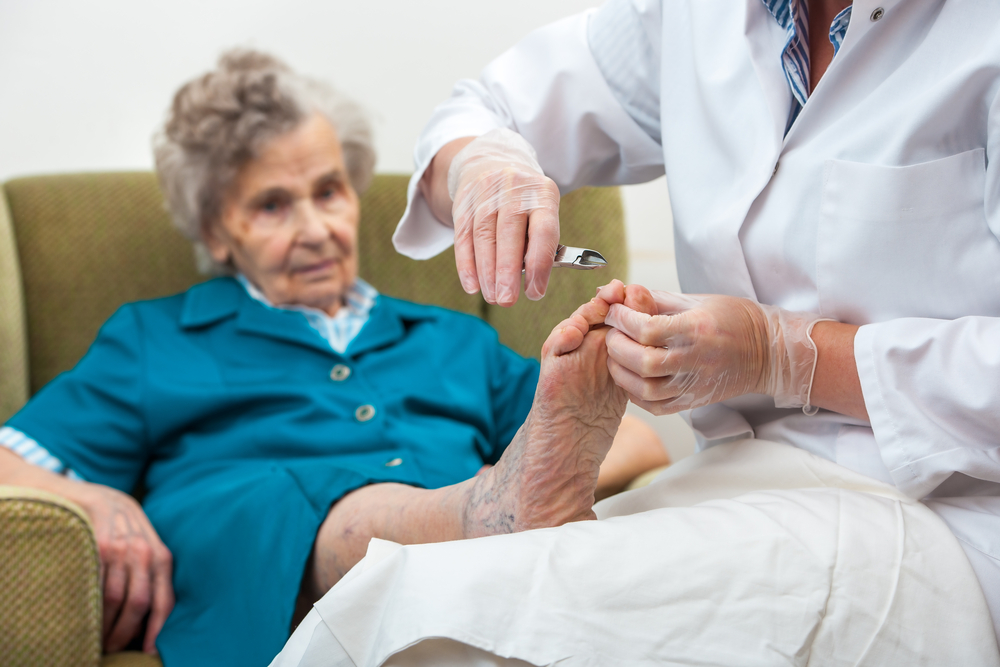Lansing (517) 321-1199

 There can be several foot problems that may occur because of obesity. Some of these may include arthritis, skin issues, and general foot pain as a result of the weight the feet must endure. Excessive weight gain may cause a lack of mobility, potentially affecting the ability to perform proper exercises. Occasionally the feet may change sizes, which can affect the width and the arch of the foot. General foot pain may be experienced as the feet strain under body weight. Gout, a type of arthritis, is a common ailment that many obese people suffer from. It is an excess of uric acid that forms crystals in the joints, and in many cases, it may cause inflammation and severe pain. Please consider a consultation with a podiatrist for information about how obesity can be controlled to improve the condition of your feet.
There can be several foot problems that may occur because of obesity. Some of these may include arthritis, skin issues, and general foot pain as a result of the weight the feet must endure. Excessive weight gain may cause a lack of mobility, potentially affecting the ability to perform proper exercises. Occasionally the feet may change sizes, which can affect the width and the arch of the foot. General foot pain may be experienced as the feet strain under body weight. Gout, a type of arthritis, is a common ailment that many obese people suffer from. It is an excess of uric acid that forms crystals in the joints, and in many cases, it may cause inflammation and severe pain. Please consider a consultation with a podiatrist for information about how obesity can be controlled to improve the condition of your feet.
Obesity has become very problematic at this point in time and can have extremely negative effects on the feet. If you’re an obese individual and are concerned about your feet, contact Dr. Harold Sterling from Michigan. Our doctor can provide the care you need to keep you pain-free and on your feet.
Obesity and Your Feet
Since your feet are what support your entire weight when standing, any additional weight can result in pain and swelling. Being overweight is one of the main contributors to foot complications.
Problems & Complications
Extra Weight – Even putting on just a few extra pounds could create serious complications for your feet. As your weight increases, your balance and body will shift, creating new stresses on your feet. This uneven weight distribution can cause pain, even while doing the simplest tasks, such as walking.
Diabetes – People who are overweight are at serious risk of developing type-2 diabetes, which has a drastic impact on the health of your feet. As you get older, your diabetes might worsen, which could lead to loss of feeling in your feet, sores, and bruises. You could also become more prone to various infections.
Plantar fasciitis – Pressure and stress that is placed on muscles, joints, and tendons can trigger plantar fasciitis, which is an inflammation of tissue that forms along the bottom of the foot.
If you have any questions please feel free to contact our office located in Lansing, MI. We offer the newest diagnostic and treatment technologies for all your foot and ankle needs.
Read more about How Obesity Affects Your Feet If you have flat feet, or a loss of the instep in your foot, you may experience heel pain that’s referred to as plantar fasciitis. Severe pain in the heel is often the result of inflammation of the ligament that runs along the bottom of the foot, known as the plantar fascia. This can be caused by wearing shoes that fit poorly or from an injury that damages the tissues. The Achilles tendon, which connects the heel to the foot, may also be affected, and it’s beneficial to incorporate stretching exercises into your daily routine. This will enhance the healing process and possibly relieve any discomfort associated with this ailment. There are several effective exercises which can accomplish this when performed daily. Some of these include standing on a step with the heels slightly hanging off and raising and lowering the leg. Additionally, rolling the arch of the foot over a tennis ball or a similar object will aid in helping the plantar fascia to become stronger.
If you have flat feet, or a loss of the instep in your foot, you may experience heel pain that’s referred to as plantar fasciitis. Severe pain in the heel is often the result of inflammation of the ligament that runs along the bottom of the foot, known as the plantar fascia. This can be caused by wearing shoes that fit poorly or from an injury that damages the tissues. The Achilles tendon, which connects the heel to the foot, may also be affected, and it’s beneficial to incorporate stretching exercises into your daily routine. This will enhance the healing process and possibly relieve any discomfort associated with this ailment. There are several effective exercises which can accomplish this when performed daily. Some of these include standing on a step with the heels slightly hanging off and raising and lowering the leg. Additionally, rolling the arch of the foot over a tennis ball or a similar object will aid in helping the plantar fascia to become stronger.
Plantar fasciitis can be very painful and inconvenient. If you are experiencing heel pain or symptoms of plantar fasciitis, contact Dr. Harold Sterling from Michigan. Our doctor can provide the care you need to keep you pain-free and on your feet.
What Is Plantar Fasciitis?
Plantar fasciitis is the inflammation of the thick band of tissue that runs along the bottom of your foot, known as the plantar fascia, and causes mild to severe heel pain.
What Causes Plantar Fasciitis?
How Can It Be Treated?
While very treatable, plantar fasciitis is definitely not something that should be ignored. Especially in severe cases, speaking to your doctor right away is highly recommended to avoid complications and severe heel pain. Your podiatrist can work with you to provide the appropriate treatment options tailored to your condition.
If you have any questions please feel free to contact our office located in Lansing, MI. We offer the newest diagnostic and treatment technologies for all your foot and ankle needs.
Read more about Plantar Fasciitis People who are elderly may experience conditions concerning the feet, such as burning sensations, dry skin, and discoloration. It may be helpful to apply a moisturizer after washing the feet in warm water. Years of use may be the culprit of increasing foot issues in the elderly, and many of these conditions may be easily treated. Shoe sizes may vary as we age, so it may be beneficial to measure the feet frequently. Wearing shoes that fit correctly will not only benefit the body’s overall health, but will help the feet to feel comfortable. Additionally, if poor eyesight or difficulty in bending down keeps the toenails from being trimmed correctly, a consultation with a podiatrist is recommended for assistance in proper foot care.
People who are elderly may experience conditions concerning the feet, such as burning sensations, dry skin, and discoloration. It may be helpful to apply a moisturizer after washing the feet in warm water. Years of use may be the culprit of increasing foot issues in the elderly, and many of these conditions may be easily treated. Shoe sizes may vary as we age, so it may be beneficial to measure the feet frequently. Wearing shoes that fit correctly will not only benefit the body’s overall health, but will help the feet to feel comfortable. Additionally, if poor eyesight or difficulty in bending down keeps the toenails from being trimmed correctly, a consultation with a podiatrist is recommended for assistance in proper foot care.
Proper foot care is something many older adults forget to consider. If you have any concerns about your feet and ankles, contact Dr. Harold Sterling from Michigan. Our doctor can provide the care you need to keep you pain-free and on your feet.
The Elderly and Their Feet
As we age we start to notice many changes in our body, but the elder population may not notice them right away. Medical conditions may prevent the elderly to take notice of their foot health right away. Poor vision is a lead contributor to not taking action for the elderly.
Common Conditions
Susceptible Infections
Diabetes and poor circulation can cause general loss of sensitivity over the years, turning a simple cut into a serious issue.
If you have any questions please feel free to contact our office located in Lansing, MI. We offer the newest diagnostic and treatment technologies for all your foot and ankle needs.
Read more about Elderly and their Feet Foot problems may become more severe if you are a diabetic, and additional care must be taken to avoid complications. There are several techniques that can be practiced for optimum foot care, including checking the feet daily for any cuts or redness, cutting the toenails correctly, and washing and drying thoroughly between the toes. If the skin becomes hardened, you may consider applying a moisturizer on the top and bottom of the feet which will promote softer skin. Choosing to wear shoes that fit well will not only feel comfortable, but will be beneficial in avoiding conditions that may lead to sores and infections. When buying shoes, it’s important to make sure the toes have adequate room to move around, and choosing a shoe with a lower heel may be helpful to avoid falling. It is of vital importance that daily foot inspections be carried out. Any type of wound, especially one that is not healing, must be addressed with immediate attention. A consultation with a podiatrist is advised to learn about the importance of proper diabetic foot care.
Foot problems may become more severe if you are a diabetic, and additional care must be taken to avoid complications. There are several techniques that can be practiced for optimum foot care, including checking the feet daily for any cuts or redness, cutting the toenails correctly, and washing and drying thoroughly between the toes. If the skin becomes hardened, you may consider applying a moisturizer on the top and bottom of the feet which will promote softer skin. Choosing to wear shoes that fit well will not only feel comfortable, but will be beneficial in avoiding conditions that may lead to sores and infections. When buying shoes, it’s important to make sure the toes have adequate room to move around, and choosing a shoe with a lower heel may be helpful to avoid falling. It is of vital importance that daily foot inspections be carried out. Any type of wound, especially one that is not healing, must be addressed with immediate attention. A consultation with a podiatrist is advised to learn about the importance of proper diabetic foot care.
Diabetic foot care is important in preventing foot ailments such as ulcers. If you are suffering from diabetes or have any other concerns about your feet, contact Dr. Harold Sterling from Michigan. Our doctor can provide the care you need to keep you pain-free and on your feet.
Diabetic Foot Care
Diabetes affects millions of people every year. The condition can damage blood vessels in many parts of the body, especially the feet. Because of this, taking care of your feet is essential if you have diabetes, and having a podiatrist help monitor your foot health is highly recommended.
The Importance of Caring for Your Feet
Patients with diabetes should have their doctor monitor their blood levels, as blood sugar levels play such a huge role in diabetic care. Monitoring these levels on a regular basis is highly advised.
It is always best to inform your healthcare professional of any concerns you may have regarding your feet, especially for diabetic patients. Early treatment and routine foot examinations are keys to maintaining proper health, especially because severe complications can arise if proper treatment is not applied.
If you have any questions please feel free to contact our office located in Lansing, MI. We offer the newest diagnostic and treatment technologies for all your foot and ankle needs.
Read more about How to Care for Diabetic Foot